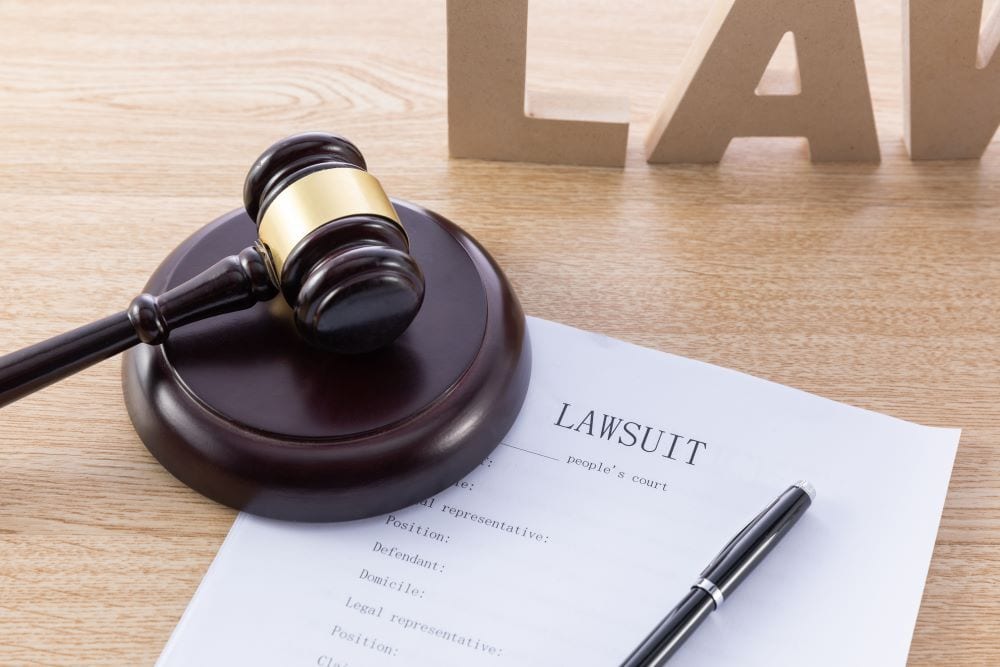
Facing workplace mistreatment and considering a lawsuit? Knowing when to sue an employer is pivotal. This concise guide walks you through valid reasons to sue such as wrongful termination, discrimination, and harassment , and what steps to take next. We provide clarity on complex situations while empowering you with the necessary insights to make an informed decision.
Identifying Valid Reasons for Legal Action
The decision to file a lawsuit against your employer should not be driven by a desire for vengeance, but rather by the pursuit of justice and the protection of your legal rights. An aggrieved employee must first identify if there is a legal ground to stand on. A legal claim can stem from several employer violated actions, including:
wrongful termination
discrimination
sexual harassment
wage and hour violations
retaliation
Each of these grounds calls for a different approach, and understanding them in detail is imperative to build a strong case.
Wrongful Termination
Consider the scenario where years of dedication to a company ends with an unjust dismissal. This could be wrongful termination, a flagrant dismissal that occurs when an employer fires an employee for reasons that violate employment law or the terms of an employment contract. Protected activities such as whistleblowing or reporting wage and hour violations should not lead to losing your job.
When an employer fires you for taking medical leave or for discriminatory reasons, it’s not just unfair; it’s illegal. In such circumstances, a wrongful termination lawsuit can be a powerful tool to redeem your employment rights and hold the employer accountable for their illegal action.
Discrimination in the Workplace
Workplace discrimination has far-reaching implications. It’s not just about hurt feelings; it’s about being sidelined due to aspects of your identity that should never affect your career trajectory. Discrimination lawsuits arise when an employer fails to provide fair employment opportunities or subjects an employee to disparate treatment based on protected characteristics such as:
race
gender
age
disability
California’s broad definition of disability under the Fair Employment and Housing Act (FEHA) means that more individuals are protected than under federal law. If you find yourself at the receiving end of discrimination based on any of these characteristics, including:
race
color
national origin
ancestry
religion
sex
sexual orientation
gender identity
gender expression
age
genetic information
marital status
medical condition
physical or mental disability
It may be time to consult with an experienced employment attorney.
Sexual Harassment
No employee should suffer the indignity and trauma of sexual harassment. When unwelcome advances, inappropriate remarks, or any form of sexual coercion permeate your work environment, it’s not only about emotional distress; it’s about the employer’s obligation to provide a safe and respectful workplace. If your employer fails to address sexual harassment, they are complicit in enabling a hostile work environment.
California law obliges employers with five or more employees to provide sexual harassment training, showcasing the gravity of such illegal activities. If you are subjected to sexual harassment and your employer does nothing to rectify the situation, taking legal action could be the most effective way to bring about change and ensure your employment rights are protected.
Wage and Hour Violations
Fair compensation for your hard work is a fundamental right, and any failure by employers to honor this principle amounts to more than just unpaid wages; it’s a breach of labor standards enforcement. Wage and hour violations can take many forms, including:
Not paying the state-mandated minimum wage
Refusing legally required overtime compensation
Denying you your rest breaks
Misclassifying you as an exempt employee to skirt around hour laws
These are not just minor oversights but deliberate employer violations that can lead to a lawsuit.
California employees, in particular, are protected by stringent wage and hour laws, ensuring that your paycheck reflects the effort you’ve put into your job duties.
Retaliation
Workplace retaliation goes beyond personal vendettas; it’s about penalizing employees who courageously stand up for their rights. If you report violations, whether they’re related to discrimination, safety, or wage and hour laws, and find yourself facing negative job consequences, this is retaliation.
California Whistleblower Protection Act is a shield for those who blow the whistle on illegal behavior, ensuring that your job is not jeopardized for doing so. Retaliation lawsuits are an avenue to assert your rights and demonstrate to employers that such illegal actions will not be tolerated in a fair employment landscape.
Assessing Alternatives to Lawsuits
Before initiating a legal battle, it’s prudent to consider alternatives to litigation. Have you tried to resolve the issue internally by reporting it to your employer or HR department? This is often the first recommended step, giving your employer a chance to rectify the situation. If that doesn’t bear fruit, consider the Alternative Dispute Resolution (ADR) programs offered by federal agencies.
ADR, especially mediation, can provide a confidential and voluntary setting where a neutral mediator assists in reaching an enforceable agreement without the need for an official ruling. With the guidance of an experienced employment attorney, you can assess the best course of action, whether it’s filing formal complaints with government agencies like the Division of Labor Standards Enforcement (DLSE) or pursuing ADR.
Preparing for Legal Action: Documentation and Evidence
If you decide to pursue a lawsuit, ensure you’re armed with substantial evidence. The foundation of a strong legal claim is built on thorough documentation of workplace wrongdoing. Pertinent details that can bolster your case include:
Emails
Pay stubs
Disciplinary actions
Any changes in job duties or employment contracts
It’s not just about gathering evidence; it’s about painting a detailed record of events that showcases a commitment to accuracy and professionalism.
Direct evidence like documents and eyewitness testimony can prove specific facts of an employment law violation, while circumstantial evidence can suggest patterns, such as an employer’s reliability based on an employee’s tenure. Remember, creating a written account of events, like summarizing discussions with superiors in emails, establishes a timeline that can be invaluable during legal proceedings.
Know Your Rights: Federal and State Employment Laws
Being aware of your rights provides critical protection, much like a shield in battle. Federal and state employment laws establish the baseline for fair treatment and safeguard your health in the workplace. States like California often go above and beyond federal mandates, offering additional protections for their residents. It’s crucial to consult the appropriate agencies to understand the specific labor laws applicable to your situation, especially if you’re a remote worker or employed in a state different from where you reside.
California’s FEHA and the DFEH, both government agency entities, are formidable guardians of employee rights, offering recourse against discrimination and enforcing compliance with state-specific labor laws.
Navigating the Legal Process with an Experienced Employment Attorney
Though the legal process can be complex and daunting, having a seasoned employment attorney by your side can help you navigate it confidently. A qualified employment attorney can provide:
A thorough assessment of your case, weighing its merits and discussing the probable challenges and outcomes
Guidance through the intricacies of employment law, including understanding the deadlines and legal procedures
An outline of the potential risks and rewards of various legal pathways
With the help of an employment attorney, you can approach your case with confidence and ensure that your rights are protected.
Whether your case involves wage and hour violations, workplace harassment, or wrongful termination, an employment lawyer can be your stalwart ally, ensuring that your voice is heard and your legal rights are zealously defended.
Filing a Complaint
To raise the curtain on a lawsuit, you must first:
File a complaint with the appropriate agency, be it the Department of Fair Employment and Housing (DFEH) or the federal Equal Employment Opportunity Commission (EEOC).
Obtain a ‘right to sue’ notice, which is a mandatory prelude to a civil lawsuit. This notice signals that the agency has either resolved the complaint or decided not to pursue it.
Remember that timeliness is key, as complaints must be lodged within stipulated time limits. For example, California’s DFEH requires filings within one year of the last incident.
An employment lawyer can be instrumental in drafting your complaint, ensuring it accurately reflects the legal grounds of your claim and advising you through the investigation and potential conciliation meetings.
Pursuing Settlements or Litigation
Once the legal gears are in motion, you’ll face a crossroads: to settle or to litigate. Settlements can be a swift resolution, often involving monetary compensation and a release of claims, without the unpredictability of a trial. However, if your case is strong and your employer intransigent, litigation might be the path to a successful outcome. Your attorney will advocate for fair compensation, represent your interests, and if necessary, guide you through the workers’ compensation claims process.
The decision hinges on various factors, including the strength of your evidence, the willingness of the employer to negotiate, and the potential impact on your future employment rights.

Pursue Justice with BLG
To traverse the terrain of employment law is no small feat, but armed with knowledge and the right legal counsel, justice is within reach. This post has illuminated the key reasons for taking legal action against an employer, the importance of thorough documentation, the role of employment attorneys in navigating legal waters, and the protective laws that uphold your workplace rights. Let this be your guide to standing up for fair employment and remember, when your rights are at stake, taking informed action is not just advisable, it’s essential.
Are you facing discrimination, harassment, or unfair treatment in the workplace? It’s crucial to understand your rights as an employee. If you believe your employer has violated those rights, it might be time to take legal action. At BLG, our experienced team specializes in employment law and is dedicated to fighting for justice on behalf of employees.
Contact us today for a free consultation.
Frequently Asked Questions
Why do employees sue their employers?
Employees may sue their employers for various reasons, such as discrimination, retaliation, violating labor laws related to wages, hours, and breaks, and illegal practices. These lawsuits can seek to protect employees’ rights and hold employers accountable for their actions.
Can you sue your boss personally?
Yes, in some cases, it is possible to sue a supervisor or manager personally, especially if they have engaged in harassing actions or discriminatory behavior, as they can face liability to employees. However, federal laws protect managers against personal lawsuits, and being named as a defendant does not necessarily mean personal liability.
Can I sue my employer for making me do something illegal?
Yes, you can sue your employer if they violate any applicable laws.
What constitutes wrongful termination?
Wrongful termination happens when an employer fires an employee for illegal reasons, such as retaliation, discrimination, or violating labor laws or employment contracts.
What steps should I take before suing my employer?
Before suing your employer, you should try to resolve the issue internally and consider alternative dispute resolution methods. Then gather documentation and evidence before consulting with an employment attorney to assess your case. It’s important to exhaust these steps before deciding to file a complaint or lawsuit.




